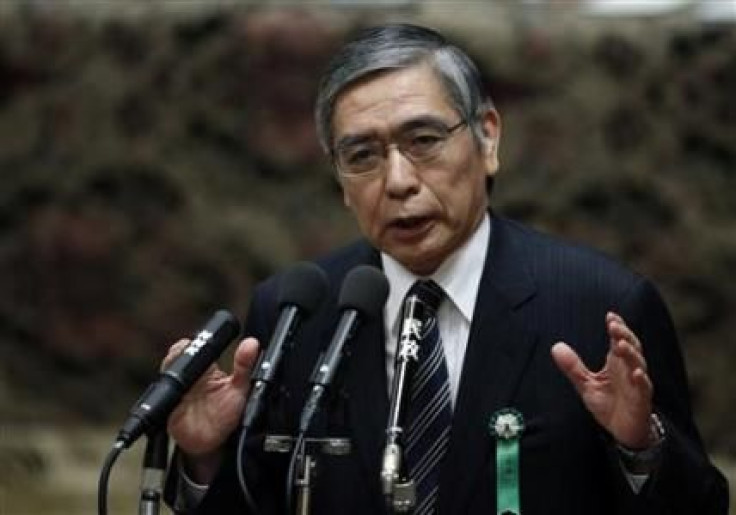Japan Parliament Approves Haruhiko Kuroda As BOJ Governor; Bold Fiscal Measures Expected

Japan’s parliament approved the nomination of former Asian Development Bank president Haruhiko Kuroda as the next Bank of Japan (BOJ) governor on Friday, clearing the way for more aggressive monetary stimulus measures from Prime Minister Shinzo Abe.
Japan's lower house had approved the nomination of Kuroda and his two deputies Kikuo Iwata and Hiroshi Nakaso earlier this week.
Kuroda, 68, a well-known advocate of aggressive policy easing, was handpicked by Abe, who was looking for support from the central bank to extend his vigorous stimulus measures. The outgoing governor, Masaaki Shirakawa, largely had a conservative approach and was seen as opposing the Abe government’s radical fiscal stimulus, suggesting it would not help the economy in the long run.
"We want the BOJ to press ahead with policy steps to achieve its two percent inflation target as early as possible," Chief Cabinet Secretary Yoshihide Suga told reporters, adding that the government would work closely with the central bank, Reuters reported.
Abe's government, which came to power in December last year promising bold measures to improve the economy, had been pursuing aggressive fiscal stimulus measures to pull the world’s third largest economy out from prolonged deflation. The Abe government increased public spending and adopted an export-friendly monetary policy that has led to a sharp depreciation of the Japanese Yen.
Kuroda’s appointment as BOJ governor was widely expected as he had the backing of the main opposition parties in the parliament. Kuroda had been openly supporting the government’s fiscal policy and has been advocating for further fiscal stimulus in his recent statements. He had also pledged to "act with speed" and had said he will “do whatever he can” to pull the economy out of deflation if he assumes the post.
Kuroda’s appointment was approved in the upper house with 186 in favor and 34 against.
The focus is now on the next BOJ policy meeting, which is scheduled to take place in early April. However, some of the BOJ officials told Reuters that Kuroda may advance the review meeting or call an emergency meeting sooner than the scheduled dates.
The economy, struggling to come out of a mild recession, grew 0.2 percent in the fourth quarter, which was in line with the analysts’ estimates on a year-on-year basis.
Kuroda and his deputies will take office after March 19. Owing to a procedural requirement, he will take office on April 8 -- when he will complete his predecessor's remaining period and then seek parliament approval again for a five-year-term.
The re-approval was necessitated as outgoing governor Shirakawa decided to step down three weeks early, together with his deputies.
© Copyright IBTimes 2024. All rights reserved.












